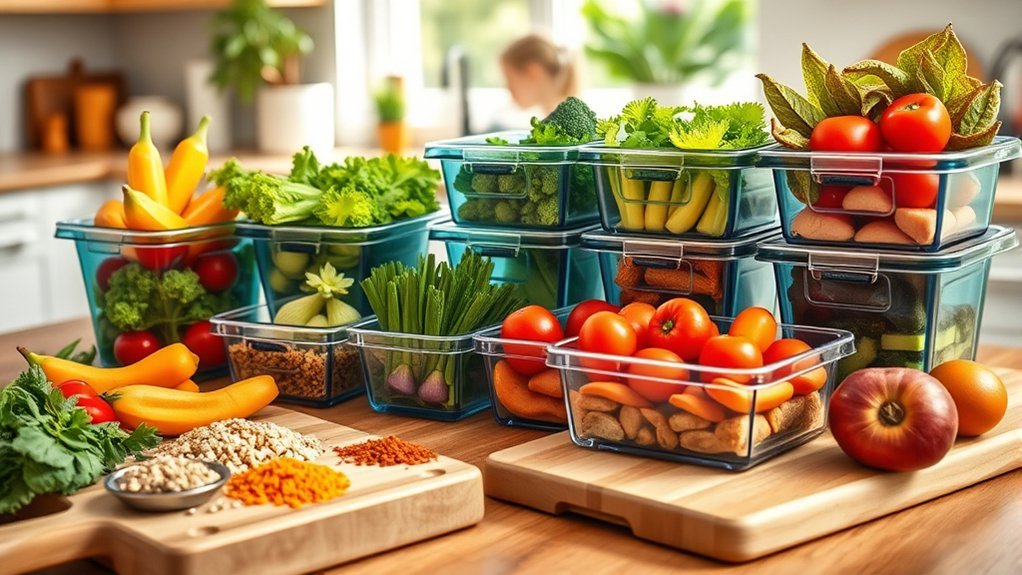Starting your day with a bowl of oatmeal topped with fresh berries can set a positive tone for your meals. These choices not only provide essential nutrients but also play a vital role in disease prevention. By incorporating a variety of whole foods, you can support your overall health and well-being. Curious about how to structure your meal plans for maximum impact? Let’s explore some effective strategies together.
Understanding the Importance of Balanced Nutrition
Understanding the importance of balanced nutrition is essential, especially when you consider how it impacts your overall health and well-being. A balanced diet provides your body with crucial nutrients, vitamins, and minerals that support your immune system, energy levels, and mood. When you prioritize a variety of foods from all food groups, you’re more likely to maintain a healthy weight and reduce the risk of chronic diseases like diabetes and heart disease. It’s not just about calories; it’s about the quality of those calories. Incorporating whole grains, lean proteins, healthy fats, and plenty of fruits and vegetables helps you achieve peak health. By making informed food choices, you’re taking proactive steps toward a healthier life. Start today and feel the difference!
Sample Meal Plans for Weight Management
When it comes to weight management, having a structured meal plan can make a significant difference in your progress. Start by incorporating a variety of whole foods, focusing on fruits, vegetables, lean proteins, and whole grains. For example, you might have oatmeal topped with berries for breakfast, a quinoa salad with grilled chicken for lunch, and baked salmon with steamed broccoli for dinner. Don’t forget healthy snacks, like nuts or yogurt, to keep your energy steady. Aim for balanced portions to help control calories without feeling deprived. Tracking your meals can also help you stay accountable and adjust as needed. Remember, consistency is key, and finding meals you enjoy makes the journey sustainable and enjoyable.
Nutrient-Dense Options for Boosting Energy Levels
To keep your energy levels high throughout the day, incorporating nutrient-dense foods into your meals is important. Focus on whole grains like quinoa and brown rice, which provide long-lasting energy. Adding lean proteins such as chicken, fish, or plant-based sources like beans can help sustain your stamina. Don’t forget healthy fats from avocados, nuts, and seeds—they’re great for energy and brain function. Incorporating a variety of colorful fruits and vegetables guarantees you get essential vitamins and minerals. Snack on Greek yogurt or hummus with veggies for a quick energy boost. Hydration’s significant too, so drink plenty of water throughout the day. By choosing these nutrient-dense options, you’ll feel more energized and ready to tackle your daily activities.
Meal Planning Tips for Disease Prevention
Meal planning not only simplifies your grocery shopping but can also play an essential role in disease prevention. By choosing nutrient-dense foods and balancing your meals, you can lower your risk of chronic diseases. Here are three essential tips for effective meal planning:
Meal planning streamlines grocery shopping and supports disease prevention through nutrient-dense, balanced meals.
- Prioritize Whole Foods: Incorporate fruits, vegetables, whole grains, and lean proteins. These foods provide essential nutrients that help boost your immune system.
- Limit Processed Foods: Processed items often contain unhealthy fats, sugars, and preservatives, which can increase disease risk.
- Plan for Variety: Rotate your meals to guarantee a diverse intake of vitamins and minerals, keeping your diet interesting and nutritious.
Simple Recipes for Healthy Eating on a Budget
Eating healthy on a budget can feel challenging, but it doesn’t have to be. Start with simple recipes that use affordable ingredients. For instance, make a vegetable stir-fry with seasonal veggies and brown rice—just sauté your choices in olive oil, add soy sauce, and serve. Another option is a hearty bean chili; combine canned beans, diced tomatoes, and spices in a pot for a nutritious meal that lasts. You can also whip up a quick pasta dish using whole grain noodles, olive oil, garlic, and spinach. These meals are not only budget-friendly but also packed with nutrients. By planning your meals and using versatile ingredients, you’ll find it easy to eat well without breaking the bank.
Frequently Asked Questions
How Do I Adjust Meal Plans for Food Allergies?
Identify your allergens, then substitute ingredients in your meal plans. Use safe alternatives like gluten-free grains or dairy-free products, and read labels carefully. Consulting a nutritionist can help guarantee balanced nutrition while avoiding allergens.
Can Meal Plans Help With Meal Prep Efficiency?
Meal plans can boost meal prep efficiency by up to 30%. By organizing your ingredients and recipes in advance, you’ll save time and reduce stress, making it easier to stick to healthy eating habits.
What Are the Best Snacks for Weight Loss?
For weight loss, opt for snacks like Greek yogurt, mixed nuts, fresh veggies with hummus, or apple slices with almond butter. These options are nutritious, filling, and help you stay on track with your goals.
How Often Should I Change My Meal Plan?
You should change your meal plan every few weeks. Like a garden needing different seeds, your body thrives on variety. Monitor your progress, listen to your cravings, and adjust to keep your meals fresh and exciting!
Can I Follow a Meal Plan While Dining Out?
Yes, you can follow a meal plan while dining out. Just choose dishes that align with your goals, ask for modifications, and focus on portion sizes. Enjoy the experience while staying mindful of your choices.
Conclusion
Incorporating a variety of whole foods into your daily meals not only fuels your body but also helps prevent chronic diseases. By focusing on balanced nutrition, you’ll find it easier to manage your weight and boost your energy levels. Remember, meal planning doesn’t have to break the bank—just like a modern-day alchemist, you can transform simple ingredients into nourishing meals. So, take charge of your health today and enjoy the benefits of a well-planned diet for a brighter tomorrow.
